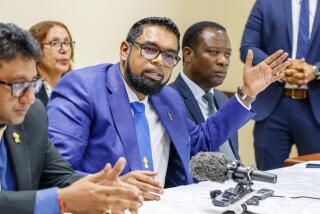Venezuela Says OPEC Will Pump More Oil : Trade: President Perez sees cartel members making up 4-million barrels of 4.6-million daily shortfall.
- Share via
BOGOTA, Colombia — Members of the Organization of Petroleum Exporting Countries have agreed to increase oil production to help make up the shortage caused by the international boycott of Iraq and Kuwait, President Carlos Andres Perez of Venezuela told Vice President Dan Quayle on Tuesday.
The dramatic disclosure, confirmed by White House officials, was relayed to Quayle by Perez in a meeting shortly before the two attended the inauguration of Cesar Gaviria as president of Colombia, according to a senior Bush Administration official.
Perez said he had consulted with all members of OPEC except Iraq and Kuwait and that those with spare capacity have agreed to increase production that could make up as much as 4 million barrels of the 4.6-million barrels a day that would be kept from the market by a boycott of Iraq and Kuwait.
A significant increase in oil output from other OPEC countries is likely to help hold down energy prices, industry analysts said, although other factors, such as further military conflict, could still send prices soaring.
Only a handful of the 13 OPEC members are in a position to boost oil production significantly, industry analysts noted, and the two largest--Saudi Arabia and the United Arab Emirates--are on the Persian Gulf, where they could be subject to attack by Iraq.
The disclosure came as the U.S.-led effort to impose international economic sanctions, aimed at forcing Iraqi President Saddam Hussein to withdraw from Kuwait, effectively shut down Iraq’s oil output.
Turkey announced it was turning ships away from Iraq’s main oil export terminal on the Mediterranean Sea, and oil industry sources said that shipping from other Iraqi oil terminals had been halted.
With the ability to expand output by about 2 million barrels a day, Saudi Arabia has the greatest spare capacity to help overcome the shortfall from Iraq and Kuwait. The United Arab Emirates has about 800,000 barrels a day of unused oil production capability.
Other OPEC countries that are expected to boost output by much lesser amounts include Nigeria, Algeria, Gabon, Ecuador, Qatar and Indonesia, for a combined increase of about 700,000 barrels a day. Cartel members Libya and Iran, however, may be reluctant to expand production, industry analysts said.
Perez said Venezuela was ready to increase its own production by 500,000 barrels a day, and industry sources indicated that the South American nation has already quietly begun to boost output.
“There will be no problem in trying to make up the short flow,” Perez told Quayle, according to the Administration official.
Before the Iraqi invasion, Iraq was producing about 3.1 million barrels a day of oil, while Kuwait was pumping 1.5 million barrels, said Patrick Connolly, senior consultant at Cambridge Energy Research Associates in Cambridge, Mass.
“If everyone with spare capacity in OPEC who is likely to cooperate did so, they could supply perhaps as much as 4 million barrels a day,” Connolly said. “You’re looking at a damn tight situation.”
Other analysts suggested that Saudi Arabia is likely to move slowly to boost output and will probably wait for U.S. troops and aircraft to arrive on the ground before stepping up oil production significantly.
“The Saudis are still scared,” said Philip Verlerger, an oil industry analyst with the Institute for International Economics and Charles River Associates, noting that Hussein could decide to attack Saudi Arabia before U.S. military forces are in place. “Tonight (Tuesday) and tomorrow night (Wednesday) are the critical moments.”
Perez said that Venezuela, a founder of OPEC, wants to hold the price of oil at $21 a barrel, the price agreed to by OPEC at its last meeting in Geneva just before Iraq’s invasion of Kuwait on Thursday.
Perez told Quayle, according to the official, that Venezuela believes in the importance of keeping oil at a steady price, without harmful fluctuations.
Perez also denounced Hussein for his aggression. “This is a dangerous man in a dangerous situation,” the Venezuelan president was quoted as telling Quayle.
Quayle, after leaving the meeting at the Venezuelan Embassy, did not discuss details of Perez’s pledge. But the vice president told a Colombian television reporter: “I agree with President Perez that there must be an unconditional withdrawal from Kuwait. The world is united on this. OPEC is united on this.”
The Quayle meeting with Perez began with a discussion of coffee, another Venezuelan export product. As a few reporters listened, Perez complained about the failure to negotiate an international agreement to keep up the price of coffee.
Quayle said the blame lies with Brazil rather than the United States and added, “Have you seen that the price of coffee is now up to a dollar? That’s where you want it.”
“Yes,” Perez replied, “but we want security.”
But soon after reporters left the room, according to the official, the subject turned to Iraq and oil.
Quayle, according to the official, asked Perez for the cooperation of Venezuela in trying to make up the shortfall of oil that would be caused by a boycott. “Carlos Andres Perez was very forthcoming,” the official said.
Meisler reported from Bogota and Redburn from Washington. Staff writer David Lauter, in Washington, also contributed to this story.
More to Read
Sign up for Essential California
The most important California stories and recommendations in your inbox every morning.
You may occasionally receive promotional content from the Los Angeles Times.













